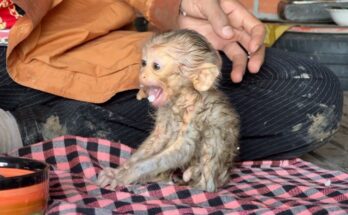The Hadzabe tribe of Tanzania, one of the last remaining hunter-gatherer societies in the world, is known for its deep connection with nature and traditional hunting practices. Among their most cherished delicacies is monkey head soup, a dish that may seem unusual to outsiders but holds special meaning and value within the tribe.
For the Hadzabe, hunting is not just a means of survival—it’s a way of life passed down through generations. When a successful monkey hunt occurs, every part of the animal is used respectfully, reflecting their belief in honoring the life taken. The monkey’s head, in particular, is considered both a treat and a source of nourishment.
Monkey head soup is said to be rich in flavor and full of nutrients. The brain and soft tissues inside the skull are boiled with wild herbs, roots, and natural spices gathered from the surrounding forest. This creates a thick, hearty broth that the Hadzabe believe boosts energy and strengthens the body, especially after long days of hunting. Elders often say the soup improves memory and sharpens the senses, which are vital skills for a hunter.
More than just food, this soup holds social and cultural importance. It’s usually shared during group meals or special occasions, where the hunters sit together around a fire, retelling stories of the hunt and bonding over the hard-earned meal. Eating the monkey head is a mark of pride, especially for young hunters who are learning the ways of their ancestors.
Though it may seem shocking to outsiders, for the Hadzabe, monkey head soup is a symbol of respect for nature, tradition, and survival. It’s a powerful reminder of how different cultures find meaning in what they eat and how food can be deeply tied to heritage and identity. In the Hadzabe world, nothing is wasted—and everything has a purpose. 🐒🔥🥣


